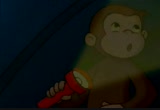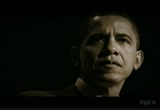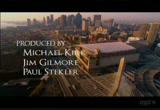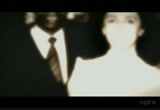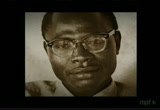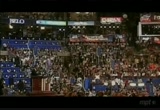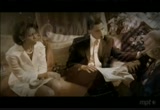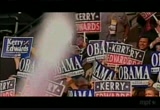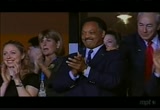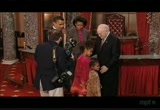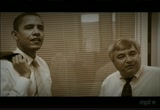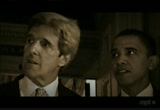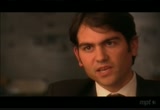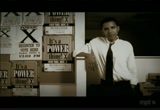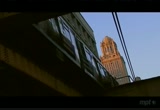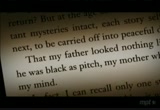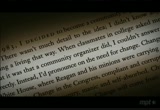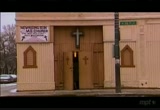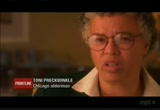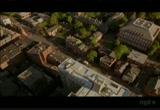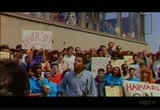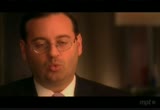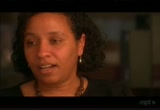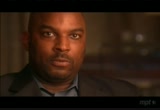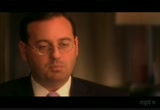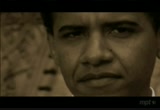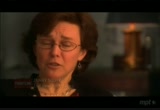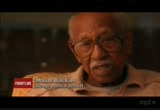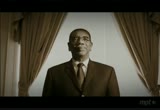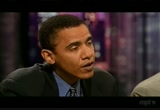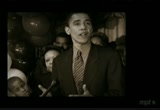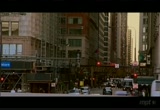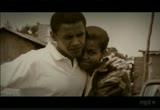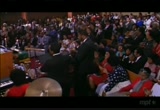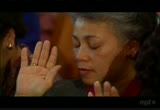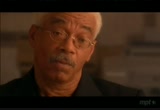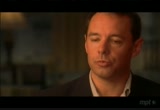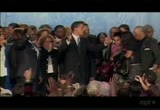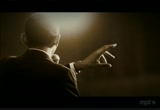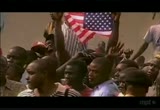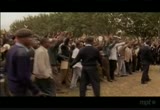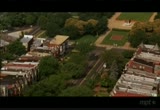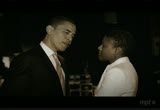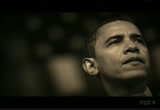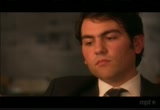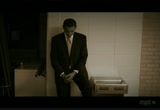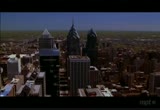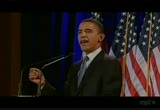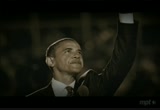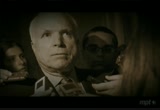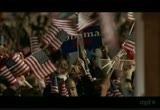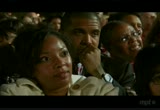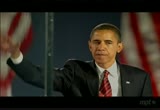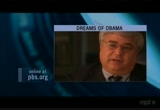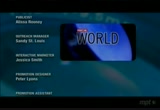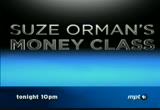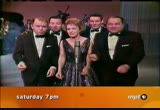tv Frontline PBS March 11, 2011 4:00am-5:00am EST
4:00 am
>> frontline is made possible by contributions to your pbs station from viewers like you. thank you. with major funding from the john d. and catherine t. macarthur foundation. committed to building a more just, verdant, and peaceful world. with additional funding from the park foundation. committed to raising public
quote
4:01 am
awareness. >> narrator: tonight on frontline... >> you have people who never thought that they would see something like this in their lifetime. >> he's smart
4:02 am
>> the delegates are trickling into boston. >> 35,000 people are expected to descend on boston. >> the convention
4:03 am
village in kenya. >> he really emerged from very, i think, unlikely circumstances. his mother was a young woman who had been raised in the midwest. >> she was born in a town on the other side of the world, in kansas. >> she met in a russian class a student from africa, during her freshman year, named barack obama. >> my parents shared not only an improbable love, they shared an abiding faith in the possibilities of this nation. >> they very quickly got married and senator obama was born in august of that year. >> narrator: in his first book, obama writes about his parents' struggle. >> the year that my parents were married, miscegenation still described a felony in over half the states in the union. in many parts of the south, my father could have been strung up from a tree for merely looking at my mother the wrong way. they would give me an african name, barack, or "blessed," believing that in a tolerant america your name is no barrier to success. >> but his father only stayed
4:04 am
for a couple of years. and then, he went to study at harvard, and left the mom and the son behind. >> the marriage really fell apart at that point. he ultimately moved back to africa. >> narrator: he would only see his american son one other time. there were other women, and seven other children. >> his whole family seems to have been pretty free-thinking. and they seem to have been a pretty non-conformist household. and certainly, his mother went on to be a very free-thinking and much-traveled person. >> narrator: his mother remarried. they moved to indonesia, but her ambitions for her son were decidedly american. >> she came into my room at 4:00 in the morning, force fed me breakfast, and proceeded to teach me my english lessons for three hours before i left for school and she went to work. i offered stiff resistance to this regimen. she would patiently repeat her most powerful defense-- "this is
4:05 am
no picnic for me either, buster." >> i think she felt like, here's this african-american child whose father has left him. he may suffer from some self- esteem issues. so she built his character up from the very beginning. she told him he was from almost a superior race of people, that he was a special person to the point that he seems to still believe that today. >> i stand here knowing that my story is part of the larger american story, that i owe a debt to all of those who came before me, and that in no other country on earth is my story even possible. >> narrator: before the speech, behind the scenes, they watched obama prepare. >> he was like an athlete gearing up for the big game. and he kind of looked like that. and even when i asked him, is he going to be a big bust tonight, or is he going to be a big star? and he said, "well, you know, i
4:06 am
got some game. i can play at this level. i'm lebron, baby." he was comparing himself, obviously, to lebron james, the phenom in the nba at that point. >> if there's a child on the south side of chicago who can't read, that matters to me, even if it's not my child. ( applause ) if there's an arab-american family being rounded up without benefit of an attorney or due process, that threatens my civil liberties. ( applause ) >> narrator: backstage, his wife michelle offered her advice. >> michelle, she didn't want him to go out there and come across as too arrogant. she gave this little "don't screw it up, buddy" line to him, which probably calmed his nerves a little bit. >> there is not a liberal america and a conservative america; there is the united states of america. there is not a black america and a white america, a latino america, an asian america; there's the united states of
4:07 am
america. >> i knew much of it was rhetorical, and when he said there's no white america, there's no black america, i kind of winced a little bit, because i know that there is certainly a black america. but i understood where he was coming from. >> hope, in the face of difficulty, hope in the face of uncertainty-- the audacity of hope. ( applause ) >> michelle sees this happening. and she has tears streaming down her... her cheeks. i'm sitting in the crowd and a woman next to me is crying, bawling her eyes out. she just keeps screaming, "this is history. this is history." >> we are one people, all of us pledging allegiance to the stars and stripes, all of us defending the united states of america.
4:08 am
>> the speech he gave in 2004 was a stump speech that he gave... i mean, i was literally watching it on television and, like, reciting it. and i was calling a friend of mine. and both of us were cracking up that this was the same speech that he used to give to crowds of, like, ten people, or in some church on the south side where, you know, no one knew how to pronounce his name and, you know, they were just meeting him for the first time, and this was a speech he would give. >> thank you very much, everybody. god bless you! ( cheers and applause ) >> this guy's going places. >> this is like watching tiger woods. >> it's amazing he's still a state senator in illinois. >> narrator: immediately, the pundits and journalists began casting obama in a new light. >> forget about uniter and divider; tonight, we heard from a transcender. >> he lit it up. >> people talk about him quite openly as the first black president of the united states.
4:09 am
>> obama is expected to be thrown into the limelight. >> he can barely show his face in public without creating some kind of sensation. >> narrator: january 2005. it's been five months since barack obama's speech at the convention in boston. now, he's the newly elected senator from illinois. >> and he arrives in the senate a celebrity, in the way that, sort of, hillary clinton was a celebrity when she arrived. >> narrator: the democrats had failed to recapture the white house or the congress. obama was their superstar, and to many, their future. >> he was sort of a person who democrats were placing their hopes in. >> narrator: the veterans knew it in their bones. they gathered around him. >> he came to the senate, almost immediately, with everyone's high expectations, with everyone's assumption that this was a man who was on a fast track. >> narrator: former democratic senate leader tom daschle had
4:10 am
lost his bid for reelection. as he left, he decided to protect and nurture the party's newest asset. >> he was looking for staff. i had what i considered to be some of the best staff on the hill. >> narrator: daschle's top aide, pete rouse, was so powerful, they called him the "101st senator." rouse wanted to retire. obama courted him. >> i may be the one person in politics who have never seen his speech at the convention. i've never seen it. never even read it, for that matter, you know, which i probably shouldn't admit to. >> narrator: obama got his man-- rouse signed on. >> you could tell he had the magic. what he said to me, "i know what i'm good at, i know what i'm not good at. i can give a good speech. but i don't have any idea what it's like to get established in the senate." >> they wanted, more than anything else, to make him look like a serious senator. so, from the very beginning, everything was done with that in mind. >> narrator: obama and his team designed a detailed two-year plan.
4:11 am
>> they put together a two-year plan to put him at the highest possible political peak going into the 2008 election cycle. >> narrator: the plan called for obama to avoid controversial issues, and slowly raise his profile. >> we took no out-of-state speaking engagements in the first nine months. didn't do any sunday shows. he didn't want to get out there and expose himself to being attacked for being somebody who was more interested in getting headlines than really doing his homework. so he had bigger plans than that. but he was very aware of the importance of being a team player and not raising people's hackles. >> narrator: but it was a big challenge to fit into the rigid traditions of the united states senate. >> it's a seniority system. he was the last person to ask a question on every committee hearing. so he would have to sit there for at least two hours before he could be heard. so there was no question that he was very much a freshman, no question at all. >> there was a story that one of
4:12 am
his staffers told me. he goes in with obama to the first meeting of the foreign relations committee, which is obama's big play. and joe biden is chairing the meeting, and it's a confirmation hearing for condoleezza rice. and so it's kind of a historic moment. and midway through the meeting, biden is just going on and on. obama scribbles-- looking very serious, scribbles a little note on a piece of paper, and passes it back to his aide. and the aide's very excited because this is the first communication from senator obama. and the note says, "shoot. me. now." "shoot," period; "me," period; "now," period. >> narrator: the freshman senator was impatient. aides say he had his eyes on a bigger prize. >> you're in a divided senate, it's hard to get anything done. you came to the senate to get things done and the excitement of getting things done, and nothing's really happening. i'm sure he's thinking there should be more.
4:13 am
i don't think he would have been a long-term senator. he's not on the path to being the leadership, to stay three, four terms. >> narrator: those who knew obama well say his ambitious streak was not new. for 20 years, he had been relentlessly and carefully working his way up, navigating treacherous political waters. >> he's someone that's long been involved in the nitty-gritty of this stuff. i don't think that's something that people always realize. i think the soaring rhetoric, the sort of icon-like image that obama has attained in this country, sometimes blinds us to the fact that he wasn't born onstage in 2004, but he had to rise through the ranks of machine politics in chicago to get where he is. and that's made him an incredibly effective politician. chicago is the capital of black america. this is the city, within a few miles of each other... >> i'm telling you what the facts are...
4:14 am
>> louis farrakhan has his headquarters... >> the honorable elijah muhammad took sharp disagreement with dr. martin luther king, jr. >> jesse jackson has his headquarters. >> our time has come. >> it's the city where harold washington was mayor. >> the whole nation is watching as chicago has sent a powerful message. >> this guy who overcame great odds and lot of racism to lead this city. >> our government will be moving forward, as well, including more kinds of people than any government in the history of chicago. >> it's the capital of black america, and i think that's one of the things that drew barack obama to that city. >> narrator: in 1985, obama moved to chicago. he was 23. he'd grown up in hawaii and indonesia, went to college in california and new york, and now he was determined to put roots down, to try to be part of the african-american political struggle. >> but at night, lying in bed, i
4:15 am
would let the slogans drift away, to be replaced with a series of images, romantic images, of a past i had never known. they were of the civil rights movement, mostly. they told me that i wasn't alone in my particular struggles. >> you read his books and you think, here's a guy who's wrestling with his own identity and his own place in the world. he is, throughout this, trying to figure himself out. >> that my father looked nothing like the people around me-- that he was black as pitch, my mother white as milk-- barely registered in my mind. >> he says in his autobiography that he realized that he had to teach himself to be a black man in america, that this was something he couldn't learn from his mother and his grandparents. >> i had nothing to escape from except my own inner doubt. i was more like the black students who had grown up in the suburbs, kids whose parents had already paid the price of escape. >> barack has had to deal with dueling identities all of his life. nurtured by a white family
4:16 am
and... and identifying with that family, but at the same time, when he's out... when he goes out, he's identified as something else. and he has had to make sense of that duality his entire life. >> narrator: obama became a community organizer on chicago's south side. >> there wasn't much detail to the idea; i didn't know anyone making a living that way. when classmates in college asked me just what it was that a community organizer did, i couldn't answer them directly. instead, i'd pronounce on the need for change. "change won't come from the top," i would say. "change will come from a mobilized grass roots." >> we had put an ad in a number of newspapers for a community organizer in the south side of chicago. and barack sent me a resume. i'm looking for anybody whose a good... who might be a good organizer, but i particularly need somebody who's african american. >> you know, one way to put it is barack obama's looking for an authentic african-american experience, and gerry kellman,
4:17 am
the chicago organizer, is looking for an authentic african american. >> he was a skinny young man, and in some of the communities he worked, there were a lot of single moms, single grandmothers. and they wanted to take him in and feed him and fatten him up. he was an eligible young man. they wanted to introduce him to their daughters and to their granddaughters, and he found a home and he was very comfortable here. >> narrator: but he wasn't always welcome. >> he had to work with a lot of different church leaders who weren't necessarily receptive to this young guy who came from the ivy league and did not have chicago roots. >> you know, chicago's a town that says, "we don't want nobody that nobody sent." well, barack was somebody that nobody sent. >> narrator: still, obama did have a model for how to succeed putting coalitions together-- the newly elected mayor, harold washington.
4:18 am
>> blacks, whites, hispanics, jews, gentiles... ( cheers and applause ) >> harold washington was surely a phenomenon. >> ...have joined hands to form a new democratic coalition. >> harold washington had to be mayor for all the people of chicago, and had to be perceived as somebody who was prepared to be mayor of all of the people of chicago, and not just a mayor for the black community. >> what washington was able to do was to put together these coalitions-- african americans, latinos, and progressive whites. and he was able to pull that together and beat the machine. and that kind of coalition building was incredibly influential for barack. >> narrator: obama had a small measure of success as an organizer, but it had its limitations. >> after two-and-a-half years, he realizes you just can't get very far at community organizing. >> it structurally was not going to change racial discrimination. it was not going to change poverty in the united states.
4:19 am
there simply would not be enough power there. >> at that point, he begins thinking about, "is there some other way to do the same job that i'm trying to do?" which is lift people out of poverty. >> he decided he needed to sort of see how politics worked on a sort of higher level than what he had access to as a street organizer in chicago. he needed to go off to law school. >> narrator: he took out student loans and was accepted at one of the nation's most prestigious law schools, harvard. >> brown, black and white-- we're all precious in god's sight. everybody is somebody... >> the political environment on the law school campus in the late '80s and early '90s was borderline toxic. >> no more racism. >> no more racism. >> no more sexism. >> harvard law school was a very divided institution. >> there's a lot of mutual
4:20 am
animosity surrounding affirmative action. it's racially a very charged time. >> people just did a lot of talking and a lot of fighting. by the end, it's like one big, unhappy family. >> ...its first black member... >> narrator: barack obama found himself in the midst of the protests-- at one point, championing the cause of a black faculty member, professor derrick bell. >> and i remember him sauntering up to the front and not giving us a lecture, but engaging us in a conversation and speaking the truth. >> he was a very public figure on campus. everyone knew who he was. he was a very well-respected leader, probably the most well- respected student on campus. >> ...simply by his good looks and easy charm... >> narrator: in the superheated racial disputes, obama had become the middleman, a conciliator. >> he's always been very adept at walking this fine line between two dramatically different worlds, whether it be black and white, liberal and
4:21 am
conservative. he's just extremely adroit at walking that tightrope. >> he was raised in a white family. he learned early on, i think, to move back and forth between different communities of people. >> narrator: the intellectual epicenter of the ideological battles tearing the law school apart was the prestigious harvard law review. >> i don't remember any physical violence. i certainly remember plenty of raised voices. i've worked at the supreme court. i've worked at the white house, i've been in washington now for almost 20 years, and the bitterest politics i've ever seen, in terms of getting personal and nasty, was on the harvard law review. >> narrator: brad berensen was a member of the conservative federalist society. one day, he and his associates would help run the bush administration. >> the conservatives on the harvard law school campus, at that time, were severely outnumbered. >> narrator: inside that toxic environment, obama's affinity
4:22 am
for the federalist students surprised his black associates. >> i don't know why, at the time, he was able to communicate so well with them-- even spend social time with them, which was not something i would ever have done. i don't think he was agenda driven. i think he genuinely thought," some of these guys are nice, all of them are smart, some of them are funny. all of them have something to say." >> narrator: no african american had ever been president of the law review. in his second year, obama decided to run for it. >> if being on the law review is a great credential and a high honor, being the president of it is the greatest credential and the greatest honor. >> the voting for the presidency was an all-day process in which... it started out in the day with a lot of candidates, and they got basically voted off the island as the day progressed.
4:23 am
>> one of my most poignant memories of the law review election process was late in the process. it's late at night, we're trying to figure out how to resolve this thing. clearly, barack has a lot of support, but it's not resolved yet. and a conservative editor, who probably disagreed with just about everything that barack stood for, got up and said that he was firmly behind barack. because we were a divided institution, this was the best person to lead the institution and to reach out to all constituencies, even though he had his own political views and made them known. >> narrator: just after midnight, he won. it was national news. >> oh, i'm honored. i think people can say that my election symbolizes some progress, at least within the small confines of the legal community. i think it's real important to keep the focus on the broader world out there and see that, for a lot of kids, the doors that have been opened to me
4:24 am
aren't open to them. >> narrator: the african american editors were ecstatic. >> i think a lot of the minority editors on the review expected him to use his discretion to the maximum extent possible to empower them. >> there was an expectation on the part of his more progressive colleagues at the law review that he would side with them on issues. >> barack was reluctant to do that. it's not that he was out of sympathy with their views, but his first and foremost goal, it always seemed to me, was to put out a first-rate publication. and he was not going to let politics or ideology get in the way of doing that. >> narrator: only one african american student received a top editor job; federalist society members were given three. >> the whole federalist slate was taking over. i was kind of hoping to get a masthead position, and i did not get a masthead position. i was hurt. i think i would call it very
4:25 am
hurt. and i told him so. i mean, certainly, he was aware of how i felt. >> i think barack took ten times as much grief from those on the left on the review as from those of us on the right. and the reason was i think that there was an expectation among those editors on the left that he would affirmatively use his position to advance the cause. >> narrator: as law school ended, obama told his classmates he had decided to return to chicago. >> in my mind, there's no doubt he would have ended up with a supreme court clerkship. but he turned his back on that and saw himself running separate from the pack, even back then. >> narrator: obama returned to chicago to teach law, make connections with the city's progressive power brokers, and learn the rough and tumble of elective politics.
4:26 am
his first opportunity came when an older, experienced state senator, alice palmer, in effect offered him her state senate seat. >> alice palmer had decided she was going to run for a congressional seat that had suddenly become open. >> she gets crushed by jesse jackson, jr. >> came back to barack with the hope and expectation that he would drop out in deference to her. he declined to do so. >> a delegation on behalf of alice palmer, including some very august figures from the south side of chicago, came to him and asked him to step out of the way and let her get... you know, run again for her seat. >> so here's barack obama. he's not from chicago. he's desperately trying to break into politics. and he's being approached by some of the elder african- american leaders of the community, people who've been around a whole lot longer than he has. people are telling him, "your time will come, just back down. just cede this seat to alice. she's the only reason you're in
4:27 am
this race anyway. you owe her." >> barack wasn't thrilled about it. "i've gone out and raised money, opened up an office, recruited people, put my name out there. and i'm supposed to take that back because you now want to change the agreement we already had? that just doesn't make a lot of sense." >> his behavior was political in chicago style. he did what chicago politicians do-- he challenged her petitions. >> narrator: obama played hardball. he had the signatures on palmer's hastily assembled election petitions compared to the actual voter registry. >> so i went down to his office and looked at petitions, and late into the night, checked them against the key book and did what i had to do. >> narrator: and while they were at it, obama checked his other opponents, too. >> not just alice palmer, but all of obama's opponents are knocked off the ballot, and obama wins his first election without an opponent. that's a pretty good way to win.
4:28 am
some of his sort of idealistic message of hope has confused people to his sort of inner toughness, you know-- the velvet glove around the steel fist. >> narrator: in 2000, obama set his sights on a congressional seat. but not just any congressional seat-- this one was held by yet another older, highly regarded figure in the black community, congressman bobby rush. >> in retrospect, many people around him say, "it was a terrible idea from the get-go, i told him that that he shouldn't do it. and he went ahead and did it anyway." so it's revealing of his extraordinary confidence that he would take on bobby rush and think he had a chance. >> bobby rush has real strong roots in the community. bobby rush was, you know, a panther. his friends, fred hampton and mark clark, were killed, and
4:29 am
bobby would've been killed. he was not there that night, but he emerged out of that fight, out of that season as a kind of tough street guy. and then he matured as a congressman into a guy that took that toughness and broadly applied that. so bobby rush had very real strength in the community. >> i mean, what has he done? >> narrator: to compete with rush, obama tried to reach a new generation of voters in the predominantly black district. >> who can best articulate and frame the issues that are most important to voters in the district? >> it was very much this theme of unity. "we should all get along with one another. we should help the most... the most vulnerable in our society. we need to rebuild our communities from the ground up." >> i think what barack's strategy is, is to emphasize the common challenges that black and white americans face. >> i know that you are a wise man and you seem very astute on the issue, but... >> narrator: but in bobby rush's district, they publicly
4:30 am
questioned whether obama had enough experience, and privately enough. >> african-american ministers have endorsed me based on myi record. >> how dedicated is he to the black struggle? >> he was fighting off these, "is he black enough?" charges. >> that's always been a subtext of the opposition to him from other black politicians. >> they looked at him with a little apprehension. >> all of these things come back in the bobby rush campaign, and they come back in a very nasty way. >> the charges of elitism. here's this harvard guy with well-modulated eloquence. what does he know about the black struggle? >> there's a long article about the race in the chicago reader, the local alternative paper in chicago, where one of obama's opponents, he says, "obama is viewed as the white man in black face in our community." >> it got bad. it was real bad. a number of black nationalists and other observers in the african-american community, you know, made all sorts of
4:31 am
allegations about barack being a tool of, you know, hyde park and the university of chicago, which are both code words for both whites and jews. >> it wouldn't be the first time that someone had called him "not black enough." i think, and what was probably surprising for him was how much traction it got and how effective it was against him in that particular circumstance. >> narrator: he believed he'd already put down roots in chicago's black community. he lived in the district, worked on civil rights cases, and, perhaps most importantly, he'd fallen in love with and married a woman from the neighborhood, michelle robinson. >> her roots in chicago went deeper than his roots in chicago.g1ó] she comes from a middle class working family with working family values and strong church values. she went to public school, and she and my daughter were classmates, they were friends, and so she has roots there. and so she would know people he
4:32 am
did not know and know places he >> that alliance gave him a kind of rootedness in that community that he really didn't have, because of the kind of relative rootlessness of his childhood and upbringing. >> for someone like me, who had barely known his fathsi spent much of his life traveling from place to place, his bloodlines scattered to the four winds, the home that fraiser and marian robinson had built for themselves stirred a longing for stability, a sense of place that i had not realized was there. >> it was a very important personal connection. in michelle he found a partner who was able to ground him, personally. the fact that she was so rooted in the community was... had obvious value. but, you know, it was very personal.
4:33 am
>> narrator: there was, inside black chicago, another place barack obama wanted to put down roots-- the church. >> obama was very sort of meticulous about going to the various pastors, interviewing them, talking to them about their churches and their reputations. so he was... he was on a sort of quest to find a church home. >> narrator: obama settled on trinity church. >> it's a big, popular inner city church that was known for its community work. >> it probably gathers the most members of chicago's black elite. >> narrator: trinity was led by reverend jeremiah wright. >> reverend wright is a very profound preacher, very scholarly, very popular in the church circles. >> apartheid is wrong! oppression is wrong! anybody who feels white skin is
4:34 am
superior to black skin is wrong! >> he had the reputation of a militant guy who could... he provided kind of a vicarious militance for chicago's black elite. so they could get a dose of militance on sunday, and go back home and feel pretty good about doing their part for the black movement. >> narrator: so membership in trinity might have been good for obama personally, and even politically, but it didn't help on election day against bobby rush. >> the last week of the campaign, bill clinton did radio spots for him on black radio. >> i'm president clinton, urging you to send bobby rush back to congress, where he can continue his fight to prepare our children for the 21st century. >> it was hopeless. >> leave bobby rush in congress. >> we lost badly-- two to one. i was the deputy campaign manager and the field director in that race, and we lost badly. >> it was the first time in his life where people didn't just
4:35 am
really accept him immediately, where things didn't really go perfectly for him. >> the bobby rush defeat helped him understand that his natural constituency were not these working class african americans with nationalist aspirations, but rather with progressive whites, progressive african americans, those who had a wider view of what... of what politics was all about. >> narrator: it would take four years for obama to put together a coalition like that. the state senator had decided to try to become the united states senator. >> obama was a little bit too much of a lone wolf in the 2000 campaign. he didn't have enough support, had sort of gotten into the race without thinking it through, which is uncharacteristic for obama. and as he plotted his next political campaign, he avoided all the mistakes of that 2000 race.
4:36 am
>> if there's a child on the south side of chicago that can't read, that makes a difference in my life, even if it's not my child. >> narrator: this is the time he signed up david axelrod. >> if there is an arab american somewhere getting rounded up with out benefit of an attorney or due process, that threatens my civil liberties, even if i'm not an immigrant. >> he had a political story to tell, and axelrod knew how to pick out the various aspects of that story and really sell them to voters. >> i worked on the south side of chicago with a group of churches that had come together to try... >> his community organizing days went over extraordinarily well with blacks. his time at harvard... >> ...had never led the harvard law review until i changed that. >> ...suddenly whites are, like, "oh, okay." they're very accepting of him. >> i'm barack obama. i'm running for united states senate and i approve this message to say, "yes, we can." >> that television campaign really sold voters on the story of barack obama.
4:37 am
>> yes, we can! thank you, illinois. i love you! >> narrator: and so just four years after his loss to bobby rush, obama put together that special coalition and a victory. >> at the victory party for his election, it looked like a replay of harold washington's mayoral victory. it really did. i mean, there were black people there who were ecstatic about the rise of this young brother and a range of white supporters, primarily these progressives who supported harold washington. it was extraordinary, really, that the way that the crowds echoed each other. >> when he first joined the u.s. senate, obama and his team had created that two-year plan, and during the first year, he had kept a low profile. but in the second year, they began to raise obama's visibility.
4:38 am
>> in 2006, he had a different strategy in his second year. and that was to be helpful to other democrats. >> narrator: the senator from illinois had national ambitions. >> this was part of the plan, was to go out and, i guess, crassly say build ious. >> and how better to sort of get the support from people in the senate than to help them? >> it is a battle about education, it is a battle about health care, it is a battle about energy, but it is also a battle about... >> narrator: and he would use the speaking engagements as an opportunity to hone his political message. >> this is the wrong war at the wrong time. every child is my child, every senior citizen deserves protection. government can help. the government can make a difference in all of our lives. >> everywhere he went, crowds were huge and enthusiastic, record crowds at all these fund- raising events. >> narrator: that summer the obama team ramped up his visibility even more.
4:39 am
they took him back to his father's roots, to africa. he'd visited in his mid 20s, after his father's death, but this time, barack obama was a potential presidential candidate. >> there were two documentary crews that went with us, one of which was funded by the campaign. there were probably 22, 23 reporters there. >> most of this trip was official business. and the significance of that was that he could have meetings with heads of state and things. so they were very much crafting his image as a world leader. >> the historic character of the trip was self-conscious. i mean, they knew what they were doing. right, you don't send a documentary crew to film you going on a vacation with your family, you know?
4:40 am
( singing ) >> the centerpiece of the trip was his visit to kenya, his father's home country. he arrived here and there were thousands, if not tens of thousands, of people sort of... who were there, ready to greet him. and it was something like i've never seen before. >> you see him at moments become sort of overcome, and so, i think, for him, it was stirring. >> it was sort of a surreal setting. people were running after his motorcade. ( chanting ) it was like this favorite son had come home. but many people viewed him as this... as the president, as this american leader. you know, people thought he was, like, the leading politician in america.
4:41 am
>> that was sort a moment for me where i sort of thought, you know, i can't imagine he doesn't run at this point. >> unfortunately, i've got to go back home, but i want to say to everybody thank you, i appreciate you and i look forward to coming back soon. >> narrator: back in washington, many of obama's advisors thought he should run for the presidency, but they say the candidate was less certain. >> i think obama had a lot of questions and a lot of skepticism about it, and wanted to approach the whole process in a methodical way. >> narrator: obama often relied on the advice of political wise men. one of them was former democratic leader tom daschle. >> we went to my favorite restaurant and took the kitchen table in the back where nobody
4:42 am
could see us. well, i tell him he should do it, and that he shouldn't assume, if he passes up this window, that there will be another. because the longer he's in washington, the more history he has. and the more history he has, the more he's going to be explaining his votes and his actions and his statements and his positions that undermine his message. >> narrator: then, obama gathered his closest friends and advisors. >> he asked us to challenge him on what he would face in running for president; to really ask the tough questions. >> some of the most skeptical people about making this race were some of his very accomplished, successful african-american friends. and i remember one saying... one person saying that, "you know, i just don't think america's ready to elect an african american." i remember barack's immediate reaction was, "i don't agree with that. and i think they are ready. but if they're not, they're not
4:43 am
going to be ready in my lifetime. so i'm willing to challenge that assumption." >> narrator: obama spent the fall of 2006 carefully considering the advice and warnings. then, it was time to make the decision. >> he went off to hawaii at the end of 2006 with his family, thought hard about it, and came back and said, "i think i want to do this." >> narrator: he wanted his presidential announcement to be an historic moment, something meaningful. it was 16 degrees on the cold february day when barack obama declared his candidacy. >> obama's scheduled to deliver this big event in springfield. and that was going to be in springfield, home of abe lincoln, it's like a very big deal for the campaign. >> oh, praise and honor to god for bringing us together here today. thank you so much. >> narrator: they had even invited his minister from trinity church, the reverend jeremiah wright, to deliver the invocation.
4:44 am
but there was a problem-- a story in rolling stone quoted some of the pastor's fiery sermons. >> "racism is how this country was founded and how this country is still run!" >> his advisors knew that wright was a big problem; that if people went back and mined what he had said, if they looked at obama and looked at wright in their relationship, that it could change the impression that people had of obama. >> what axelrod told me later is that the campaign became worried that fox news would blast these quotes from obama's crazy pastor. so they yanked wright. they basically told him that you he couldn't be part of this event, and wright got very mad. >> i stand before you today to announce my candidacy for president of the united states of america. ( cheers and applause ) >> on that cold, cold morning, not to have reverend wright give the invocation was certainly a sign that they knew there was some problem brewing. i think the question was, how
4:45 am
big a problem was it? how could they deal with it if it erupted, and could they just keep it in the back? >> thank you very much, everybody. let's get to work! i love you. thank you. >> super tuesday is over; the presidential nominating contests are not. >> narrator: for months, barack obama and hillary clinton would battle in one primary state after another. eventually, as the race drew closer, a controversy erupted that threatened obama's candidacy-- those sermons by reverend wright. >> god damn america! that's in the bible, for killing innocent people. god damn america for treating her citizens as less than human. >> he saw them on television. we're told that he was jarred by it. he knew it was a problem. >> david plouffe is obama's campaign manager who said that was the episode "that could have destroyed our campaign."
4:46 am
he called it "a direct torpedo to the hull." so, inside, they were absolutely terrified that it all could have ended with wright. it was that big a deal at the time. >> wright was perfect fodder for cable, for talk radio, for the internet-- to allow any message obama wanted to be put forward to be completely overwhelmed. wright became the obama story. >> i am sick of negroes who just do not get it. >> narrator: the pressure on obama to do something was enormous. >> his hand is forced to finally really tackle this issue, ironically, so that he's not perceived as an angry black politician in association with the rhetoric of reverend wright would suggest. >> narrator: it would be left to obama to figure out how to handle it. after a few days, he decided. >> he said, "i want to do a speech on race. i want to put this in context." he said, "and i want to do it on monday or tuesday," he said,
4:47 am
"but i have to be... i have to write it." >> today, obama promises to tackle the issue of race head on in pennsylvania. >> race is now officially on the table. >> he must get beyond this race debate, and soon. >> this campaign is calling this speech an important moment. >> major address on race, politics and unifying our country. >> what may be the most important speech of his campaign... >> narrator: obama chose the constitution center in philadelphia for the speech. >> thank you so much. thank you. thank you. i believe deeply that we cannot solve the challenges of our time unless we solve them together, understanding that we may have different stories, but we hold common hopes. >> i mean, this is a moment of sort of maximum peril for a candidate. and his goal was to elevate out of that moment into something broader. >> we've heard the implication that my candidacy is somehow an exercise in affirmative action. >> jeremiah wright, god bless him, allowed barack obama to confront this issue sooner rather than later, and i think
4:48 am
it allowed him to regain the upper hand. >> i can no more disown him than i can disown the black community. i can no more disown him than i can disown my white grandmother- - a woman who helped raise me, a woman who sacrificed again and again for me, a woman who loves me as much as she loves anything in this world, but a woman who once confessed her fear of black men who passed her by on the street, and who on more than one occasion has uttered racial or ethnic stereotypes that made me cringe. these people are part of me. and they are part of america, this country that i love. >> this was not your usual barack obama event. >> the speech was a political necessity. >> it was a nuanced take on race relations in this country. >> i give senator obama a lot of credit. >> barack obama gave the most expansive and most intensely
4:49 am
personal... >> one of the most of his career that will likely be talked about for the rest of this campaign. >> narrator: eventually, the reverend wright controversy receded, and the battle with hillary clinton ended in june. >> i pledge my support to the next president of the united states, barack obama. >> narrator: against long odds, obama had secured the democratic nomination. >> i accept your nomination for the presidency of the united states. >> i think what people saw in him was a groundedness. this is not a politician who is given to great highs or great lows. there's a steadiness to him that i think people saw and grew more comfortable with through the course of the campaign. >> narrator: in the general election, obama confronted the highly experienced republican senator, john mccain. >> i've been called a maverick. i don't work for a party. >> so, for a guy like obama to run with virtually no experience, 20 years ago, would have been highly, highly
4:50 am
unlikely, perhaps impossible. it's very rare moments in history when somebody with that level of experience can expect to get a serious hearing for the nation's highest office. >> narrator: for a few weeks, the race was neck and neck. voters seemed uncertain about whether obama had enough experience. then, a crisis emerged. >> tomorrow morning, i'll suspend my campaign and return to washington. >> narrator: the american economy crashed. >> when the financial crisis hit, the american people had a good chance to see two potential presidents deal with a crisis. in a very strange sense, obama became the conservative at that moment, at least when you think temperamentally. >> ...that our economy is strongest as one nation. >> that was the moment where he just looked steady and calm and normal, and mccain didn't. >> narrator: in the final weeks, pollsters said voters had come to believe obama was "plausibly presidential."
4:51 am
( cheers and applause ) >> barack obama is projected to be the next president. >> senator barack obama of illinois will be the next president. >> barack obama will be the 44th president of the united states. >> ladies and gentleman, the next first family of the united states of america... ( cheers and applause ) >> that night, when he came out, the look on his face, to me, looked like someone who finally understood the weight of the job that he had just won. >> if there is anyone out there who still doubts that america is a place where all things are possible, who still wonders if the dream of our founders is alive in our time, who still questions the power of our democracy, tonight is your
4:52 am
answer. >> it was almost as if the weight of the world had rested on his shoulders. and at that point he wanted to say "okay, i get it. i'm trying to digest it. i'm trying to absorb it." >> this is our moment. this is our time to restore prosperity and promote the cause of peace; to reclaim the american dream and reaffirm that fundamental truth-- that out of many, we are one. >> you still have people who never thought they would see something like this in their lifetime. you talk to african-american voters, you know, they never thought that they would see an african american who was a serious contender for the presidency of the united states. never thought in their lifetime that they would see it. before i met barack obama, i never thought i would see it in my lifetime. >> while we breathe, we hope,
4:53 am
and to those who tell us that we can't, we will respond with that timeless creed that sums up the spirit of a people: yes, we can. thank you. god bless you, and may god bless the united states of america. ( cheers and applause ) >> you have to go back in history a long, long time to think of president who comes into office with as much trouble to deal with as barack obama: a war in iraq, a war in afghanistan and the worst economic crisis we've had since the great depression. that is a huge, huge set of problems to deal with. and no matter whatever the euphoria of becoming the first african american to be elected, barack obama is a pretty serious guy about knowing what the next steps look like. and you could see some of that in him on election night in grant park. ( cheers and applause )
4:54 am
>> explore more on our web site, where you can watch the program again online. >> ...whether it be black and white, liberal and conservative, he's extremely adroit at walking that tightrope. >> explore frontline's interview with insiders and observers who've tracked obama over the years... >> he has had to make sense of that duality his entire life. >> read more about his character and temperament, his ambition and meteoric rise... >> ...to announce my candidacy for president of the united states of america. >> and how he won this historic election. and then join the discussion at pbs.org.
4:55 am
>> narrator: next time on frontline world... from guantanamo to albania... >> he said, "they're in albania." and i said, "where are they, really?" >> narrator: ...what happens after gitmo? in sicily, how a whole town stood up to the mob. and in brazil, barack obama runs for... mayor? >> ♪ barack obama... >> narrator: on the next frontline world. captioned by media access group at wgbh access.wgbh.org
4:56 am
>> frontline is made possible by contributions to your pbs station from viewers like you. thank you. with major funding from the john d. and catherine t. macarthur foundation. committed to building a more just, verdant, and peaceful world. with additional funding from the park foundation. >> this is pbs.
4:57 am
>> announcer: an important message from mpt. >> hi, i'm ellie wang, mpt commissioner, and an avid fan of the arts and cultural programs that can only be found on mpt. public television opens doors to the richness and diversity of our nation and is offered free to all. please join me in preserving this worthy service.
945 Views
IN COLLECTIONS
WMPT (PBS) Television Archive
Television Archive  Television Archive News Search Service
Television Archive News Search Service 
Uploaded by TV Archive on

 Live Music Archive
Live Music Archive Librivox Free Audio
Librivox Free Audio Metropolitan Museum
Metropolitan Museum Cleveland Museum of Art
Cleveland Museum of Art Internet Arcade
Internet Arcade Console Living Room
Console Living Room Books to Borrow
Books to Borrow Open Library
Open Library TV News
TV News Understanding 9/11
Understanding 9/11